This Woman Critiqued Millennial And Boomer Parents, But The Way Both Generations Reacted Is Eye-Opening
BuzzFeed
8 min read

Clearly, not all members of a certain generation are the same. However, certain trends do tend to show up based on the shared culture we grew up in — especially when it comes to parenting techniques. Compare the stranger-danger 1990s to the more laidback parenting of the 1970s and '80s, for example.

Rapideye / Getty Images
Recently, 32-year-old Stephanie Lindeman LMHC, LMFT, a therapist based in the Tampa Bay, Florida area, unintentionally demonstrated a big difference between millennial and boomer parents when she posted videos critiquing each generation's parenting style on her TikTok, and they responded in opposite ways.

Stephanie Lindeman
In one video, she warned that millennials will mess our kids up by ignoring their bids for attention in favor of scrolling on our phones. She ends the video asking, "Who do you want them to get their attunement and connection from, you or someone else?"

@stephanne221 / Via tiktok.com
The comment section on this video was full of millennial parents owning this behavior and discussing ways to break out of it to be more present for their kids. One person wrote, "This called me out. I need to be more conscious about my own screen time around my daughter."
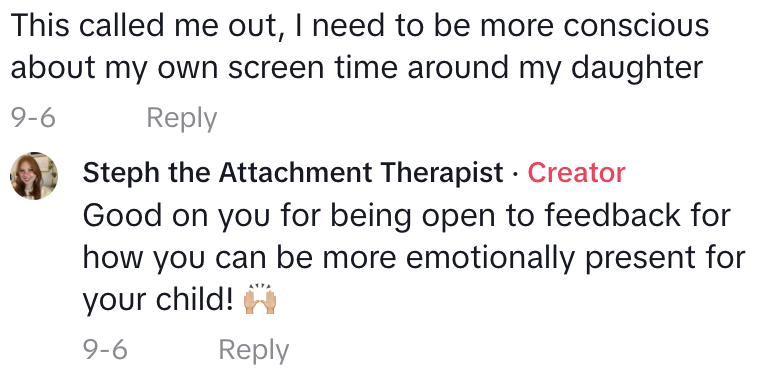
@stephanne221 / Via tiktok.com
You can watch the full video here:
@stephanne221 / Via tiktok.com
Soon after, she made a video discussing a trend she's noticed while working with boomer parents who are struggling to maintain relationships with their adult children. She says, "Here's the most important thing I've learned from boomer parents as a family therapist: the price of not taking accountability is isolation." Then she goes on to explain that she often sees boomers become defensive or lash out rather than apologizing for their past hurtful behavior, which results in kids staying away.
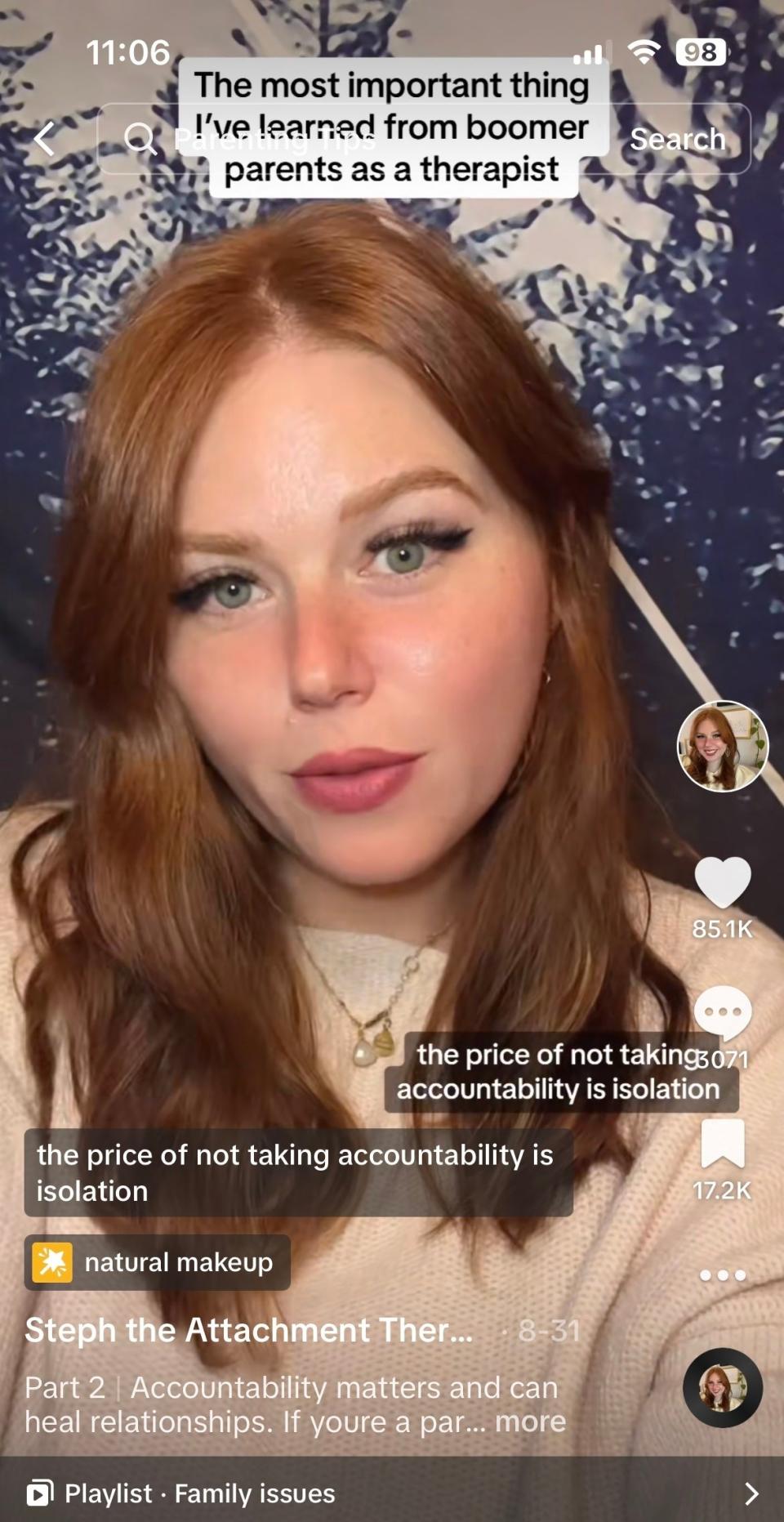
@stephanne221 / Via tiktok.com
In the comments, many children of boomer parents chimed in to agree with her point and wonder how they can get this message across to mom and dad. One person wrote, "I learned from my boomer parents that if I want to cry, they will give me something to cry about."

@stephanne221 / Via tiktok.com
A couple of boomer parents even joined the conversation to say that they completely agree and this is something they are working on.

@stephanne221 / Via tiktok.com
But further down the thread, many of the responses from boomers were not so gracious.

@stephanne221 / Via tiktok.com
You can watch the full video here:
@stephanne221 / Via tiktok.com
After noticing the difference in how the two generations responded to this kind of feedback, Stephanie shared a third video that's since been viewed over 1.2 million times. She begins by saying, "I didn't intend to do this. I accidentally conducted a social experiment in my comment sections, and the results are hilarious and also tragic."
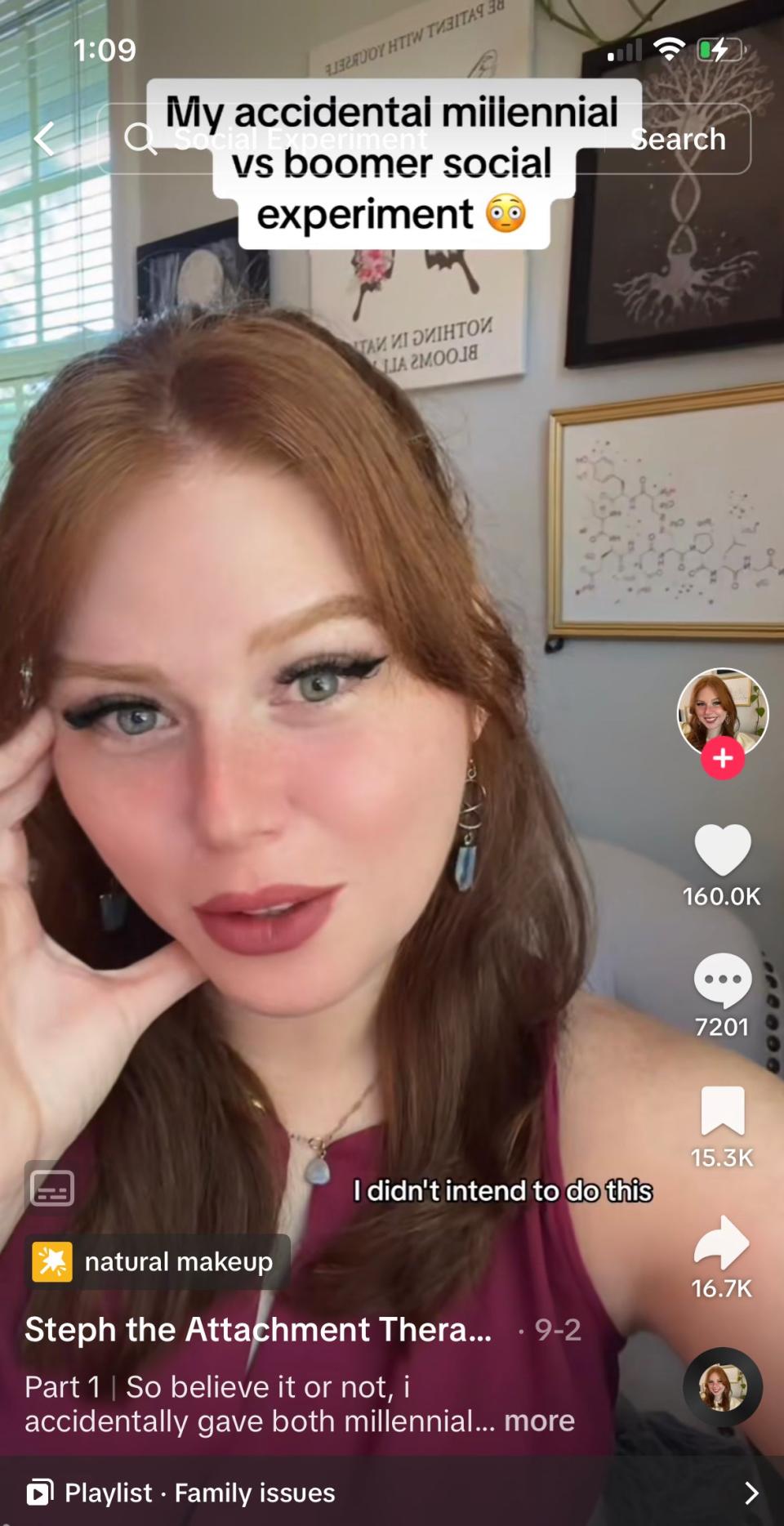
@stephanne221 / Via tiktok.com
She shows comments from each generation, then says, "Both generations of parents were given feedback by me around how their behaviors are hurting their children, and this is how each generation chose to respond. Here's the sad part, though: The way that these boomer parents responded to me and other adult children in the comment section is a window into how they responded to their own adult children when their children came to them with feedback and pain."
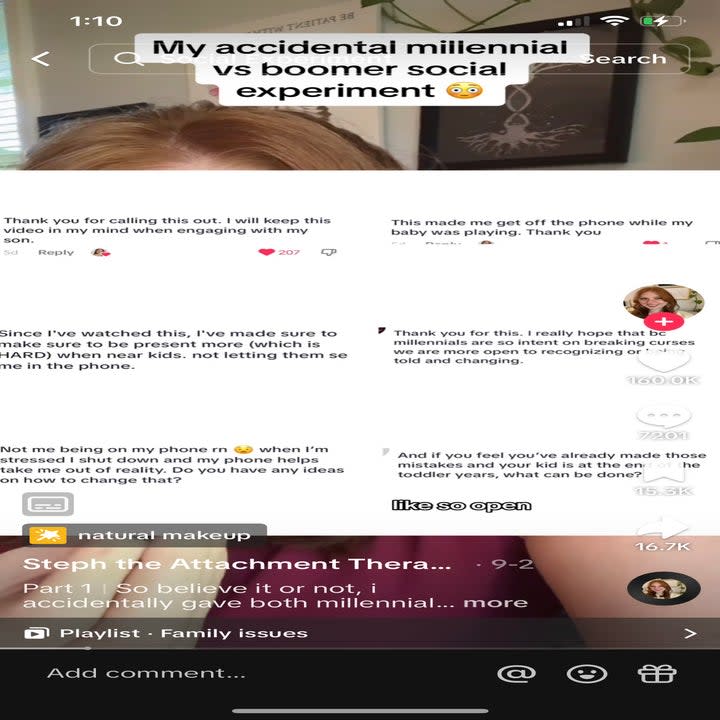
@stephanne221 / Via tiktok.com
Watch the full video here:
@stephanne221 / Via tiktok.com
I thought Stephanie's accidental experiment was fascinating, so I reached out to her via email to learn more about her takeaways. She shared that before the experiment, she had noticed boomer parents having more trouble with taking accountability; however, people of any and all generations can have this problem.

HBO / Via giphy.com
Stephanie explains, "One thing I hope that is clear from this 'experiment' is that every person has a strategy for avoiding unwanted emotions, and these strategies have an impact on our relationships. No one is a bad person, parent, or partner because they avoid unwanted emotions (e.g., boredom, embarrassment, guilt, shame, resentment, regret, etc.). However, these strategies can be ineffective for building relationships, whether it's boomers avoiding accountability or millennials being on their phones."

Photo By Rafa Elias / Getty Images
And she wasn't expecting to see such a generational difference in the way people responded to feedback about their parenting. "The generational difference in responding to this feedback, though, was surprising. I didn’t predict that millennial parents would be so open, receptive, and frankly inspiring. This has gotten me very curious about the differences in resilience in the face of unwanted emotions between the two generations."

Westend61 / Getty Images/Westend61
Stephanie goes on to theorize that perhaps the real difference between the two generations lies in our relationship with shame. "It’s possible that millennials overall are better resourced socially and emotionally, which makes them better able to navigate shame and be able to connect to curiosity and compassion. It’s possible that boomers are under-resourced socially and emotionally when it comes to shame, and they’re getting stuck in it, which makes them more prone to close-mindedness and reactivity."

Keithsutherland / Getty Images/RooM RF
She also points to differences between the generations in when we're willing to open up or seek support. "I, of course, cannot know what it feels like to be a boomer parent and can only make observations from the ones I work with. And what I have seen is folks who seem to be remarkably unknown by others — so many boomers have attempted suicide, lost pregnancies, and questioned their sexuality all without ever telling their partner, let alone telling their own parents when they still could. That’s what I mean when I say I think it’s possible that they’re under-resourced socially — they lack that social support of being able to turn to a close friend or loved one for that crucial co-regulating."
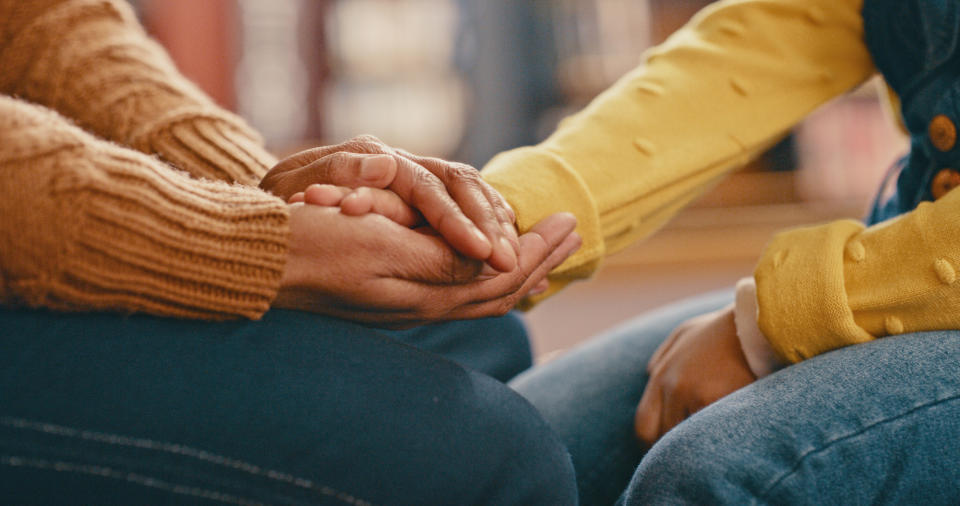
Kobus Louw / Getty Images
She also observes that millennials, who tend to be more open, can find this level of reserve in our parents' generation really hurtful. And we sometimes try to do the emotional work for our parents, which only burns up our energy. "I want to caution children of boomers from over-functioning to get their needs met — meaning, trying to regulate mom and dad’s emotions so they can be well enough to meet your own needs. Doing this is going to make you vulnerable to repeating this same dynamic with your romantic partner; it can be controlling, and ideally is unnecessary!"

Fox / Via giphy.com
Lest you think Gen X is getting left out, I asked Stephanie for her thoughts on them, too. She says, "I see more willingness and openness from this generation compared to boomer parents to try and go further in their support and tolerating their own personal discomfort with their child’s therapy process. I do think I see more hesitation around vulnerability compared to younger generations, which makes sense. Being vulnerable is a risk, and taking risks as a parent is particularly frightening, especially if your own parents didn’t role model this for you!"

Aleksandarnakic / Getty Images
Finally, she shared hopeful messages for boomer parents and their adult children. "One of the most common questions it seems that boomers posed in my comment section was around the idea of, 'It must be too late now, right?' I have good news for you — it’s not. You’re right, you can’t undo the past, and for this healing process, you don’t have to. The pain from the past is still alive in your child today. You can acknowledge your child’s pain right now and help them heal."

Ascentxmedia / Getty Images
"The bond of the parent and child is sacred, and extremely powerful. Your loving attention, your heartfelt apology, and to be known by you, the parent, is more powerful than any type of therapy. My job as a family therapist is to help people shed their strategies, and then get out of the way because your parental love is what does the healing. You can absolutely do this, and you are worthy of being supported and resourced during this process. I hope that you can find the courage to seek the support you deserve to heal the relationship with your child."
And to adult children whose parents aren't open to having these conversations, Stephanie says, "For the adult children, from any generation, who feel repair is not or cannot be a possibility for you, yours is a journey of grief. Free yourself of any guilt, shame, and false hopes by grieving the loss of parents you needed to have but didn’t. Grief is acknowledging that your heart has been in pieces this whole time. Self-compassion and self-love will be your Kintsugi*."
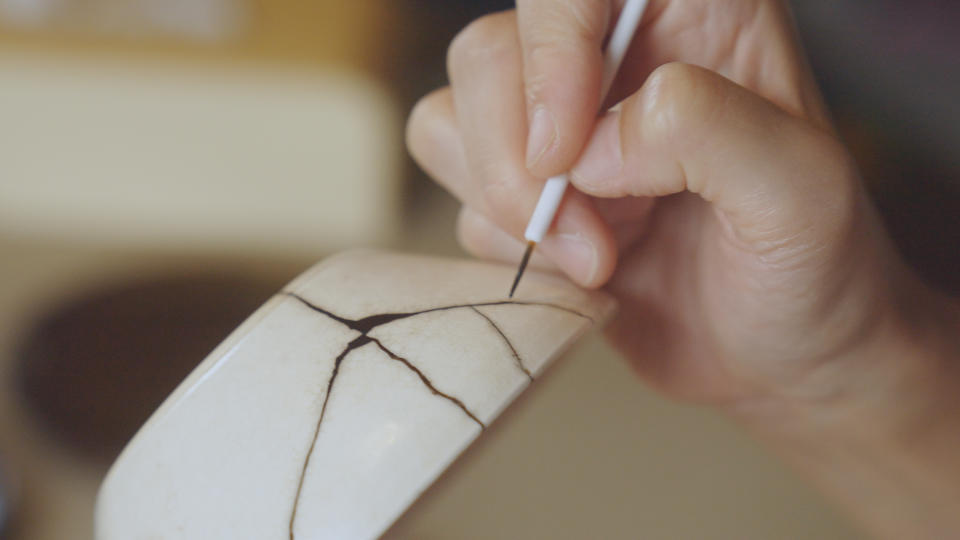
*Kintsugi is the art of repairing broken pottery using gold to fill in the cracks, creating a a finished object that is even more beautiful for having been broken.